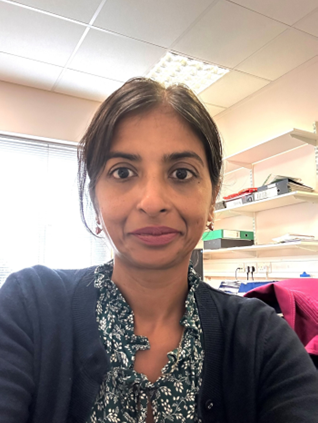'Meet the member' series
Find out more about the work of some of our members.
Click below to hear from Dr Sophia Senthil (pictured left) and Dr Amala Jesu (right).


Biography
My interest in Medicine was instilled by my parents who saw it as a noble profession and from a very young age I wanted to become a doctor. I completed Medicine in Tamil Nadu, one of the southern states in India in 2003. Soon after graduation, I came to the UK for postgraduate training. After doing some locum jobs in psychiatry I entered the run-through programme in psychiatry in 2008. During my core training years, I became inspired by the work done by late Professor Bhaumik and his team in Leicester and chose to do higher specialist training in ID.
I have continued to be actively involved and contributed to local research and education in Leicester. Outside work I love travelling and reading books. I have always enjoyed learning new skills, (this being classical dance and music in recent times) and it has helped me to stay motivated and balanced.
What made you choose psychiatry?
I graduated in India at a time when exposure to psychiatry and mental health was very limited. As a specialty it wasn’t very sought after amongst medics and most gravitated towards acute clinical specialties. This was also largely related to the stigma around mental illness. I however have always been fascinated by human emotions and behaviours. I have enjoyed listening to people’s stories even whilst working in acute hospital placements. After moving to the UK for post graduate training I had the opportunity to shadow clinicians in a few medical specialties, such as general medicine and paediatrics, but I didn’t enjoy the experience and couldn’t see myself working in those specialties.
In my first experience as a clinical observer in a busy mental health hospital in London, I was able to see the impact of mental illness on people’s health and wellbeing, and the pivotal role of mental health professionals. To be able to treat and make a difference to the mental wellbeing of people felt very rewarding and motivated me to pursue a career in psychiatry.
Tell us about your current professional role?
I have been working as a consultant psychiatrist in ID for over 8 years. My clinical role is community-based, working with adults who have ID and associated mental health problems and behaviours that challenge. My special interest areas include assessment/management of autism and ADHD. My other interest areas include teaching medical students and training core/higher trainees in psychiatry. I work closely with the local clinical leads and have been involved in the development of care pathways within our service. I also recently became the chair of the East Midlands Regional Clinicians ID group (EMRC). This group plays a pivotal role in sharing local experience, training/job opportunities and providing support for ID clinicians in the region.
What would you say to someone considering a career in psychiatry?
Psychiatry is an incredibly rewarding specialty, and I would encourage anyone with an interest to do a placement in Psychiatry. For example, Foundation doctors can ask for this in FY1 and FY2 or it could be a non-training post too. It is essential that you are a keen listener with good communication skills and compassionate. Remember, however, that working in psychiatry has its own challenges. Your health and wellbeing are very important and taking time out for yourself will give you the much-needed resilience to handle the pressures that work may throw at you.
What does your role as ID Regional Representative at the College involve?
Becoming a member of the Trent Division has given me great networking opportunities with the college. ID services in the region have always had strong links with the college and I aspire to make a positive difference to our specialty and the people we serve.
What do you enjoy most about being involved in the work of the College?
It is easy to feel isolated and alone when you are a consultant. Developing strong links with the college gives a sense of belonging and part of a peer group. It is also empowering to know that you are contributing to key decisions affecting the practice of psychiatry. It has been insightful to see first-hand, the outstanding work that is delivered by college, be it recruitment, training or support in any other area. It is also inspiring to see other fellow psychiatrists’ work and learn from each other.
Biography
Perinatal Psychiatrist, MBBS, MRCPsych, PG Certificate in Leadership & Management (Keele), CCT in General Adult Psychiatry.
What made you choose psychiatry?
During my medical student years, I was intrigued by how psychiatry as a speciality connects with people attempting to understand in aspects of background and context why, and how they become unwell, informing the approach to their treatment.
Having spent nearly 20 years working in mental health, I realise another speciality would not have given me similar rewarding experience, and as this is a profession which draws on scientific, medical, and interpersonal skills in day-to-day working. and help people realise their potential which is often linked with their recovery.
Tell us about your current professional role?
I am a perinatal psychiatrist; I work in community setting with women who are pregnant and have had their babies up to 2 years postpartum. My role involves supporting and advocating women who suffer from mental illnesses during one of the sensitive periods of their life sometimes rendering them vulnerable. My role extends to ensuring unborn babies and infants have a right emotional and physical environment to thrive and flourish, while supporting and guiding women and their partners adequately.
What would you say to someone considering a career in psychiatry?
Psychiatry is one of esteemed profession, and indeed it is a speciality that deserves privilege and honour where we listen to people’s stories while remaining compassionate and ensuring right leadership approach working within your team and systems containing your emotions, and intervening and supporting when required. It nurtures your curiosity as scientific understanding of illness and their treatment is evolving rapidly, and a speciality where you can identify your niche, and strengths as you progress enabling you to develop both as a person and professional.
What does your role as CPD Lead and Mentoring Lead at the College involve?
I was elected early this year as executive member of general adult faculty of the college and nominated to work in executive role within Trent division. I joint chair academic secretary within the faculty and lead CPD events within Trent division.
What do you enjoy most about being involved in the work of the College?
I enjoy being part of delivery latest developments in service provision, training and education taking shape and being implemented, being able to advocate for gaps for individual patients and families and supporting trainees and medical students develop their full potential as psychiatrist and doctors.

